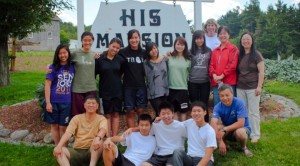
Residents at His Mansion from all over the country come for its free treatment programs, which help people recover from substance abuse, depression, eating disorders and addiction. Three stages of treatment guide residents towards recovery after a month-long induction, and the entire program lasts for about a year.
These volunteers learned about His Mansion through a recruitment session at the 5th Home of Christ on Bubb Road in March. His Mansion has no fundraising or advertising sector—residents and volunteers discover the institution primarily through word of mouth. Volunteers are not paid, and His Mansion does not receive money from the government; rather, it accepts donations.
Jiang and Yau had been trying to land a different work opportunity, but after that fell through they decided to see what His Mansion was all about. Zhang wanted to get out of Cupertino to experience a more outdoorsy lifestyle, while Lin’s interest was piqued because of her interest in potentially working in the rehabilitation field.
Located on a hill barely within the town’s borders, His Mansion provides unreliable Internet connectivity and cellphone reception, but whatever technology is lost is made up by the center’s lush surroundings. Essentially, His Mansion is a farm, and the residents and volunteers work to feed pigs and cows, take care of plants, move wood and hay and do chores like cooking and doing the laundry. Jiang, Lin, Yau and Zhang worked at His Mansion for the first week, then went to classes for the second week. The classes taught at His Mansion are centered around the keystone concept for year-long residents, Healing in Christian Community (HCC).
The one week course on HCC had volunteers, who were of all ages and from all over the country, discuss life experiences with one another. Zhang became especially close to one of her classmates, an 83-year-old woman named Carolyn.
“I feel like it’s really interesting to talk to someone much older than you are because they have so much more experience,” Zhang said. “I just came out of [regular U.S. history], so a lot of the things we studied about, she lived through. She lived through the Great Depression, she lived through Vietnam, the Cold War, all that fear … and she remembers when she was younger, when her mom would make them clothes and they would be saving resources all the time.”
Yau, who stayed at His Mansion two weeks longer than Jiang, Lin and Zhang, had the opportunity to get to know some of the residents better as well. One resident, an ex-felon named Randy in his first stage of treatment, stood out to him in particular. Randy came from a broken home and had been involved with drugs before he came to His Mansion.
“He was talking to me about some things to keep in mind in high school—how to approach people who have these problems, and he really emphasized to me not to think, ‘Oh, they’re just the druggie crowd,'” Yau said.
His Mansion gave valuable bonding experiences to the volunteers as well as opportunities to hike, break a sweat, catch a sunset and escape from technology.
“It’s humbling to see how much you can learn from everyone—anyone, really. Everyone has a story to tell, because people are people, and no one is perfect,” Zhang said.







